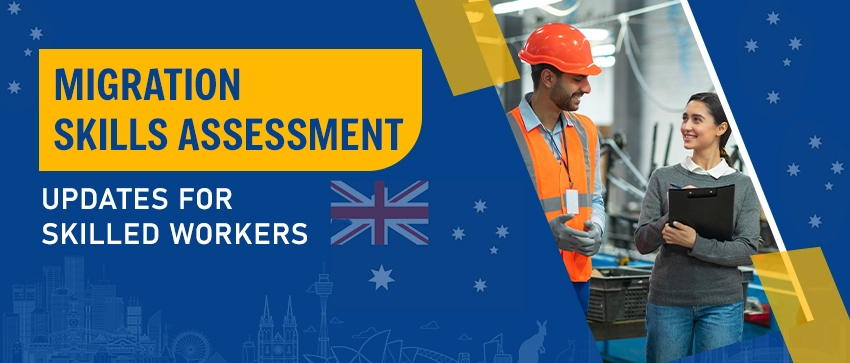
If you’re trying to get a skilled visa in Australia, your migration skills assessment is the stage that unlocks everything that follows. No matter how strong your experience is or how perfectly your job matches the Skilled Occupation List, nothing moves until the assessing authority approves of your skills.
Several assessing bodies have implemented stricter rules, updated evidence requirements, and changed how they evaluate offshore and Australian qualifications. This means you can’t rely on information from last year or even last semester. You need to stay informed of the latest updates. This saves endless back-and-forth and even delays or refusals.
Let’s break down what actually affects skilled workers living in Melbourne right now.
Emphasis on Recent and Verifiable Experience
Authorities like ACS, VETASSESS, Engineers Australia, and TRA have made a big shift toward stronger verification. They call employers and cross-check info. They even ask for clearer job descriptions and reject vague reference letters.
If you’re applying for a Migration Skills Assessment in Melbourne, be prepared. They’ll look at everything closely. For many occupations, experience older than ten years carries reduced or no weight. Some authorities now ask for pay slips from specific periods instead of general proof of work. Offshore applications face higher scrutiny.
- Keep your employment letters crisp and specific.
- Update your CV to match actual roles, not generic ones.
- Gather bank statements, PAYG summaries, etc., before starting the application.
Many applicants in Melbourne come from India, Nepal, Sri Lanka, the Philippines, and the Middle East. Assessing authorities have been re-evaluating certain universities, technical diplomas, and private institutes from overseas. Some are now assessed at a lower AQF level than before.
This is one of those updates that catches people off guard. You finish your degree back home, move to Melbourne, build experience, and then suddenly the qualification isn’t considered equivalent anymore.
- Check whether your overseas qualification still aligns with the required AQF level.
- Add supporting evidence. Include transcripts, detailed course outlines, and internship certificates.
- A Graduate Diploma or Certificate in Melbourne can sometimes bridge the gap in your qualifications.
Updated ANZSCO Interpretations
Even though ANZSCO codes don’t change often, the way assessing bodies interpret them does. A job title alone serves no purpose. You need roles that clearly match the tasks listed under your occupation.
Several Melbourne applicants get stuck because their roles are too hybrid, too supervisory, or too administrative to meet the code they picked.
Here’s the trick: Look at your daily roles. If they drift away from the ANZSCO description, adjust your employer letter accordingly. Keep it real, without exaggeration or made-up roles.
Changes in English Requirements
A few assessing bodies have aligned English requirements closer to the Department of Home Affairs. Besides, even if your visa pathway doesn’t need a high IELTS score, your skills assessment might.
- Some engineering and IT assessments are now stricter about valid English test dates.
- VETASSESS is enforcing minimum English for more cases, especially where qualification evidence is weak.
Seats fill quickly around university exam seasons. So, if you’re based in Melbourne, book your test early.
Faster Processing for Australian Qualifications
Applicants who studied in Melbourne, especially at accredited universities or TAFE institutes, often get faster decisions now. Assessing bodies trust local course structures, units, and assessment records. The documentation is clearer, easier to verify, and aligned with Australian standards.
This doesn’t mean offshore graduates are at a disadvantage. It simply means you need stronger evidence to show that your qualification matches the required level.
Trades Are Seeing the Most Movement
Trade occupations are frequently updated compared to white-collar roles. TRA and VETASSESS have been revising practical requirements, video evidence formats, and employer declaration templates.
If you’re in Melbourne working as a chef, carpenter, electrician, automotive mechanic, or welder, stay alert. A template you used last year might no longer be accepted today.
Melbourne dates fill up faster than any other city. So, book your technical interview or practical assessment early.
Skills Assessment vs PR Points: The Gap Is Widening
A skills assessment only confirms competence. It doesn’t guarantee a high invitation score. Right now, many Melbourne applicants are realising that meeting the skills assessment standard is much easier than reaching the 80–90 points needed for some PR pathways.
Because of this, more people are:
- Switching to regional pathways.
- Trying state nomination through Victoria’s skilled migration program.
- Completing shorter courses that add points (NAATI, Professional Year, trade course certifications).
Staying flexible helps you avoid getting stuck after the assessment stage.
What Skilled Workers in Melbourne Should Do Next
Here’s the simplest way to stay ahead of the updates:
Keep track of the updates.
- Keep your documents updated even if you’re not applying yet.
- Get employer letters while you’re still working with that organisation.
- Consult a migration agent in Melbourne before submitting anything.
People wait too long or rely on unauthorised advice. This causes most delays.
Final Thoughts
The Migration Skills Assessment in Melbourne is not a ‘submit and forget’ process. It’s active, evolving, and demanding. Just stay up to date, prepare your documents well, and match your evidence to the right ANZSCO code. With all of this done, you’re already ahead of half the applicants.
Unsure about any step or need help keeping up with updates? It is best to stay in touch with an expert who handles similar cases as part of their job.



